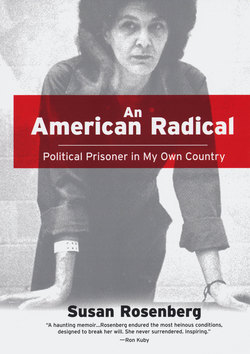An American Radical:

Реклама. ООО «ЛитРес», ИНН: 7719571260.
Оглавление
Susan Rosenberg. An American Radical:
Advance Praise for An American Radical
Contents
Foreword by Kathleen Cleaver
Acknowledgments
Chapter 1 Explosives
Chapter 2 Arrested
Chapter 3 Detention
Chapter 4 Conviction
Chapter 5 Transport
Chapter 6 Tucson Federal Prison
Chapter 7 Lexington High Security Unit
Chapter 8 Litigation
Chapter 9 D.C. County Jail
Chapter 10 AIDS Epidemic
Chapter 11 Cancer
Chapter 12 Mariana Maximum Security
Chapter 13 Breaking Rank
Chapter 14 My Father
Chapter 15 Danbury General Population
Chapter 16 AIDS Epidemic
Chapter 17 PAROLE
Chapter 18 Political Prisoners
Chapter 19 Cancer
Chapter 20 The Hill
Afterword
Notes
Отрывок из книги
“Susan Rosenberg’s An American Radical is remarkable—and terrifying. In taut, unadorned prose, she recounts her sixteen years imprisoned in American jails, much of that time spent in isolation and high-security units. That she survived at all is something of a miracle. Her stark, harrowing story is all at once mesmerizing, horrifying, and deeply saddening. Her revelations about the U.S. prison system and its various forms of torture and diminishment should forever prevent glib distinctions between our ‘democratic’ system and that of totalitarian countries. Rosenberg herself emerges as an admirable, remarkably resilient, and honorable figure.”
—Martin Duberman, Distinguished Professor of History Emeritus, City University of New York, and author of more than twenty books
.....
The next day they took us outside to the recreation yard. It was a small dog run, but at least it was outside in a space bigger than any we had occupied since arriving in Tucson. We walked in a tight circle, almost march-stepping in our orange jumpsuits. I agreed to strike with Alex, to refuse showers, food, and even any further rec. The two of us then started singing as loud as we could: “La Borinqueña,” “Gracias a la Vida,” “This Land Is Your Land,” songs by Woody Guthrie, and on and on until they came for us. Our strike lasted several days. Finally, they moved us back to isolated cells—“segregation”—on the women’s side. This meant that we were no longer side by side with men in the next cell. They said it was because they needed the cells we were in.
Initially, the month spent in segregation after those horrendous days in the men’s unit was a relief. It was possible in the quiet to think. But it was in that month that the full and terrible meaning of doing time hit me. It hit me so hard that I, in turn, fractured my hand banging on the cell door.
.....